
1.Guide for Marriage Registration with Expats, Overseas Chinese and Residents from Hong Kong, Macau or Taiwan
Basis: Marriage Law of the People’s Republic of China, Regulations on Marriage Registration, Norms for Marriage Registration.

Qualifications
A.Marriage Registration
b.The male party must be at least 22 years old and the female party must be at least 20 years old;
c.Both parties are single (unmarried, divorced or widowed);
d.Both parties have no direct blood kinship or collateral blood kinship within three generations;
e.Both parties must marry out of their own will;
f.Both parties shall submit 3 two-inch bareheaded half-length photos recently taken of both parties;
g.Both parties shall hold valid certificates as stipulated in Articles 29 to 35 of the Norms for Marriage Registration.
a.Both parties shall apply to the marriage registration office for divorce together;
b.Both parties have the full capacity for civil conduct;
c.Both parties must hold a divorce agreement. The divorce agreement shall record both parties’ intention of voluntary divorce and consensus on issues of bringing-up children, property and liability;
d.Both parties hold marriage certificates issued by a marriage registration office in Mainland China or a Chinese embassy or consulate;
e.Both parties shall present 2 two-inch, half-length and bareheaded photos.
f.The parties shall hold valid certificates as stipulated in Articles 29 to 35 of the Norms for Marriage Registration.
A.Marriage Registration
As for Chinese citizens who are going to get married to expats in mainland and Chinese inland residents who are planning to get married to residents from Hong Kong, Macao or Taiwan or overseas Chinese in mainland of China, both the male party and female party shall apply to the marriage registration office of the municipal civil affairs bureau in the place where the permanent household of the Chinese inland resident is registered. The following documents and certificates shall be submitted:
a.Chinese inland residents: His/her household register and ID card;
b.Expats:① His/her valid passport or other valid international travel documents; ② His/her marital status certification issued by the notary public or competent authority of his/her country and certified by the consulate of the People’s Republic of China in his/her country, or certified by the consulate of his/her country in China, or his/her marital status certification issued by the consulate of his/her country in China.
c.Overseas Chinese: ① His/her valid passport; ② His/her marital status certification and proof that he/she has no direct blood kinship or collateral blood kinship within three generations with the counterparty provided by the notary public or competent authority located in the residence country and certified by the consulate of the People’s Republic of China in the residence country, or issued by the embassy or consulate of the People’s Republic of China in the residence country.
d.Hong Kong, Macao or Taiwan residents: ① His/her valid exit-entry permit and ID card; ② Statement that he/she is single and has no direct blood kinship or collateral blood kinship within three generations with the counterparty provided by the notary public located where he/ she resides.
e.Declaration of Application for Marriage Registration signed by him/her, in which the signature must be completed by the declarant in the presence of the marriage registrar who serves as the oath administrator;
f.two-inch, half-length, bareheaded photos recently taken of the couple.
a.Both the male party and the female party desiring to contract a marriage are required to go to the mar- riage registration office together to apply for marriage registration;
B.Divorce Registration
Procedures
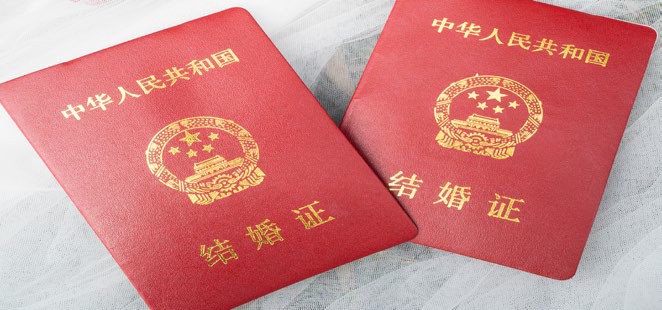
B.Divorce Registration
As for Chinese citizens who are planning to voluntarily divorce expats in mainland and Chinese inland residents who are planning to voluntarily divorce residents from Hong Kong, Macao or Taiwan or overseas Chinese in mainland of China, both the male party and female party shall apply to the marriage registration office of the municipal civil affairs bureau in the place where the permanent household of the Chinese inland resident is registered. The following certificates and documentation shall be submitted:
a.Chinese inland residents: His/her household register and ID card; Hong Kong, Macao or Taiwan residents: His/her valid exit-entry permit and ID card; Overseas Chinese and expats:His/her valid passport or other valid international travel documents;
b.His/her marriage certificate;
c.Divorce agreement agreed by both parties, recording both parties’ intention of voluntary divorce and consensus on issues of bringing-up children, property and liability;
d.Declaration of Application for Divorce Registration signed by both parties, in which the signature must be completed by the declarant in the presence of the marriage registrar who serves as the oath administrator;
e.Both parties shall present two-inch, half-length and bareheaded photos
Marriage Registration Office of Civil Affairs Bureau of Qiaoxi District, Shijiazhuang City (Add: 3/F, Building B, Citizen Service Center, No. 377, Xinshi Middle Road)
Tel: 0311-83810725
Handling Site
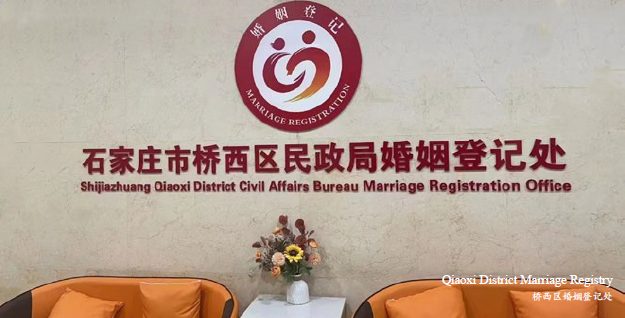
2.Adoption registration
Registration Authority:Department of Civil Affairs of Hebei Province
Acceptance Conditions
The applicant meets the statutory application requirements. The application documentations are complete and comply with the forms and conditions stipulated by laws, decrees and regulations.
Processing form :Window processing
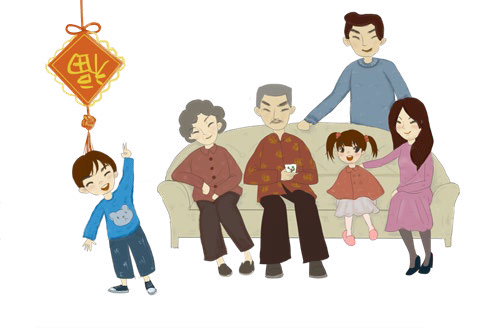
Handling Site :Room 103, Department of Civil Affairs of Hebei Province, No. 69, Xiangyi Road, Xinhua District, Shijiazhuang City, Hebei Province
Relevant Regulations
A.Basis
The Civil Code of the People’s Republic of China, the Measures for Registration of Expats Adopting Children in the People’s Republic of China, and the Measures for Registration of Expats Adopting Children in the People’s Republic of China.
A expat who is to adopt a child in China shall, through the government of the country where he or she resides or an adoption organization delegated by the government of the said country (hereafter referred to as the foreign adoption organization), convey an application for adoption and submit the adopter’s family situation report and a certificate to an adoption organization delegated by the Chinese government (hereinafter referred to as the Chinese adoption organization).
a.The adoptee shall be:
① Minors under the age of 18;
② Orphans;
③ Minors whose biological parents cannot be ascertained or found and who are under the care of a social welfare institution;
④ Children whose biological parents are unable to rear them due to unusual difficulties;
b.Persons placing out children for adoption shall be:
① Guardians of an orphan;
② Social welfare institutions;
③ Biological parents unable to rear their children due to unusual difficulties;
c.The adopter shall:
① The adopter shall be childless or have only one child;
② Be capable of rearing, educating and protecting the adoptee;
③ Be suffering no such disease as is medically regarded as unfit for adopting a child;
④ Have no criminal record that reflects poorly and would prevent the adoption and raising of the adoptee;
⑤ Have reached the age of 30.
d.Special conditions
① Adoption of a child and the placing out of the child for adoption shall be both on a voluntary basis. Where the adoption involves a minor aged 8 or more, the consent of the adoptee shall be obtained;
② The childless adopter may adopt two children. The adopter with child(ren) may adopt one child only. Orphans, disabled minors, or minors whose biological parents cannot be ascertained or found and who are under the care of a social welfare institution may be adopted irrespective of the following restrictions:
i The adopter shall be childless or have only one child;
ii The childless adopter may adopt two children. The adopter with child(ren) may adopt one child only;
iii Where a male person without spouse adopts a female child, or a female person without spouse adopts a male child, the age difference between the adopter and the adoptee shall be no less than 40 years.
B.Implementation Authority
C.Acceptance Conditions
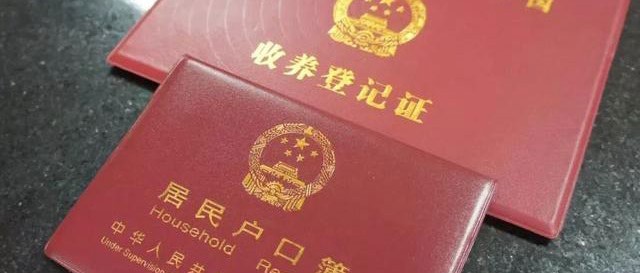
D.Documents for Application
The following documents that are issued by the competent agencies of the country where the adopter resides and, authenticated by a diplomatic department of the country where the adopter resides or by an agency authorized by the said diplomatic department, and authenticated by the embassy or consulate of the People’s Republic of China stationed in that country:
a.An application for inter-country adoption;
b.A birth certificate;
c.A certificate of marital status;
d.A certificate of profession, income and of property conditions;
e.A certificate of health examination;
f.A certificate indicating whether the adopter has ever been subjected to criminal punishment;
g.A certificate certifying the approval of the inter-country adoption by the competent authority of the country where the adopter resides;
h.A family situation report, recording the identity of the adopter, the eligibility and appropriateness of the adoption, family status and medical history, adoption motivation, and characteristics suitable for taking care of children, etc.
Expats who have continuously lived in China for more than one year for work or study and are to adopt children in China shall submit the documents stipulated in the preceding paragraph except for the certificate of health examination, and shall also submit certificates indicating such particulars of the adopter as marital status, profession, income or property condition and whether they have ever been subjected to criminal punishment, which are issued by the Chinese units to which they belong, and certificates of health examination issued by medical units at or above the county level.

The person placing out a child for adoption shall submit to the civil affairs department of the people’s government of a province, an autonomous region or a municipality directly under the Central Government his or her household register, resident identity card (where a social welfare institution places out a child for adoption, then the identity credential of the person in charge of such an institution shall be submitted), and residence certificate of the adoptee, etc., and shall submit the following certifying papers according to different situations:
a.Where the adoptee’s biological parents (including divorced ones) are the persons who place out the adoptee for adoption, a certification certifying that the biological parents cannot rear the adoptee due to unusual difficulties and a written consent of both of the biological parents on the placing out for adoption shall be submitted; among those, where the adoptee is placed out for adoption by a single parent because the adoptee’s biological father or mother has been widowed or missing, a certification certifying that the single parent’ spouse has died or has been missing, as well as a written declaration that the missing parent has given up the priority in rearing the child shall be submitted.
b.Where a guardian is the person who places out the adoptee for adoption because the adoptee’s parents have no full civil capacity, a certification certifying that the adoptee’s parents have no full civil capacity and may do serious harm to the adoptee and a certification certifying that the guardian has the right of guardianship shall be submitted;
c.Where a guardian is the person who places out the adoptee for adoption because both of the adoptee’s parents have died, a certification certifying the death of the adoptee’s biological parents, a certificate certifying the guardian’s actual bearing of obligations of guardianship as well as a written consent of other persons bearing rearing obligations on the placing out for adoption shall be submitted;
d.Where a social welfare institution acts as the person who places out a child for adoption, a certification of the situations in the abandonment and discovery of the abandoned infant or child, and a certificate of the process of the search of his or her parents or other guardians shall be submitted; where the adoptee is an orphan, a certification certifying the death or the declaration of death of the orphan’s parents as well as a written consent of other persons bearing the obligations of rearing the orphan on the placing out for adoption shall be submitted.

Where a disabled child is placed out for adoption, a certificate of disability of the child issued by a medical unit at or above the county level shall also be submitted.
The civil affairs department of the people’s government of a province, an autonomous region or a municipality directly under the Central Government shall examine the credentials and certifying documents submitted by those who place out children for adoption, and issue public notices to ascertain or look for the biological parents for those abandoned infants or children whose biological parents cannot be ascertained or found; where the adoptee and those who place out children for adoption are believed to meet the requirements stipulated in the Adoption Law, a list of their names shall be given to the Chinese adoption organization, and the following cre- dentials and certifying papers shall be conveyed simultaneously:
a.Copies of household register and resident identity cards of those who place out children for adoption (if a social welfare institution places out a child for adoption, the identity credential of the person-in-charge of such an institution);
b.Copies of certificates certifying that the adoptees are abandoned infants or orphans, their household registration certificates, growth reports and health examination certificates as well as photos of the adoptees.
Counseling Tel:0311-88615603
Source: Foreign Affairs Office Of Shijiazhuang Municipal People's Goverment
Events
More+-

Chengdu Symphony Orchestra2025-2026 Season Concert—Music Talk Series 2“Chinese Spring Festival Melodies”
-

Exhibition of Zhao Yunyu’s Calligraphy and Painting from the Chengdu Museum Collection
-

The 55th Chengdu InternationalPanda Lantern Festival
-

The 29th China (Sichuan) New Year Shopping Festival
-

2026 BJ Online New Year Shopping Festival Unfolds









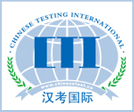

 京公网安备
京公网安备